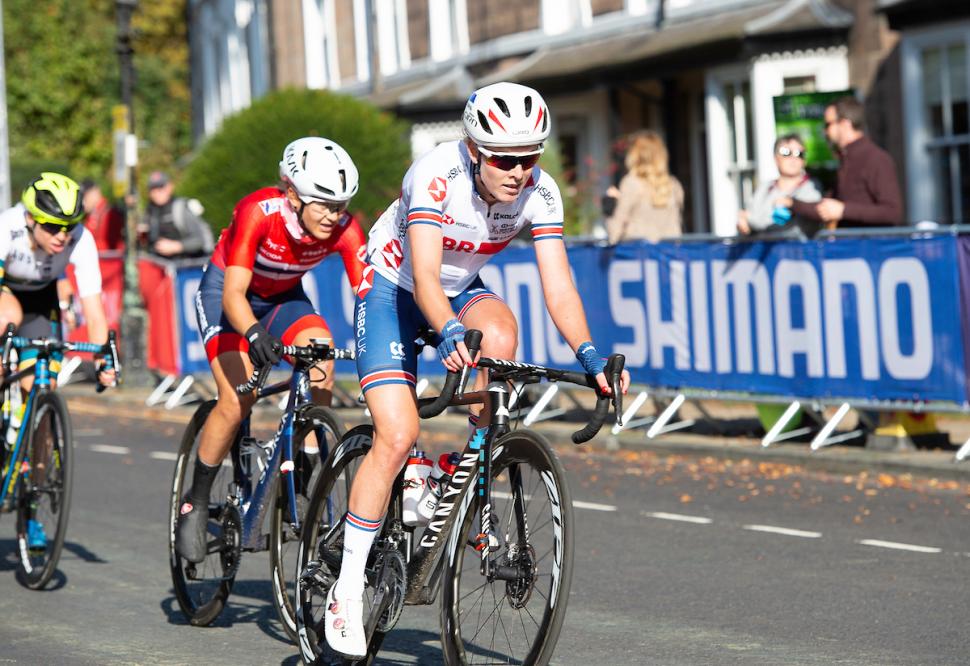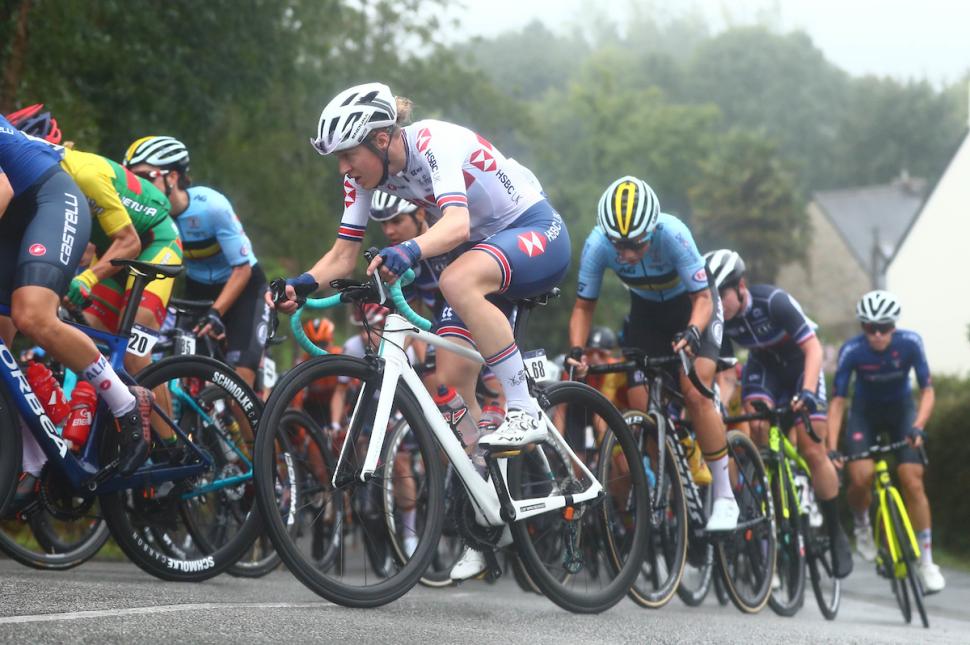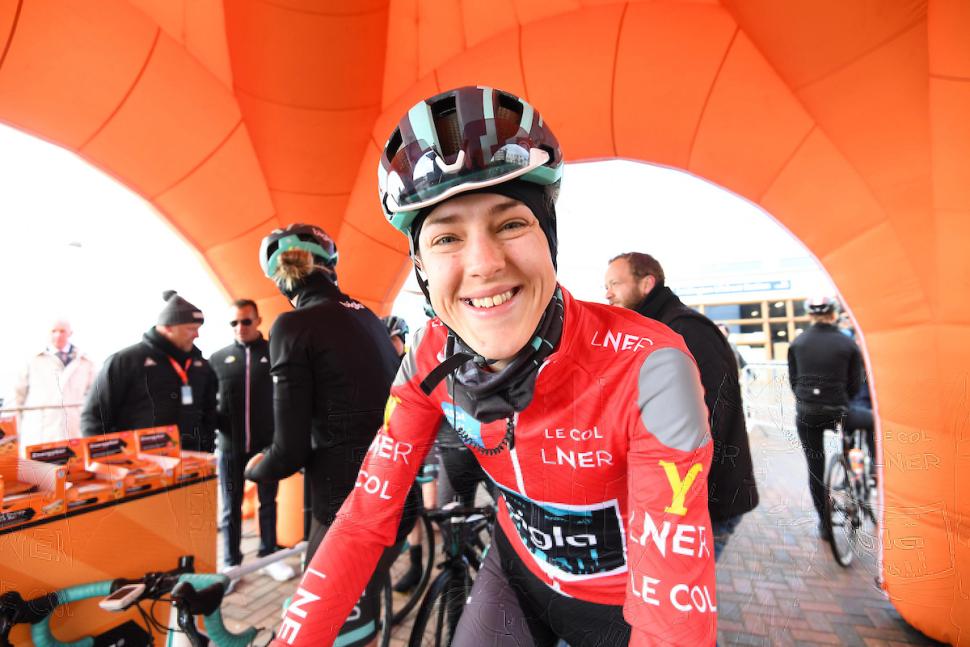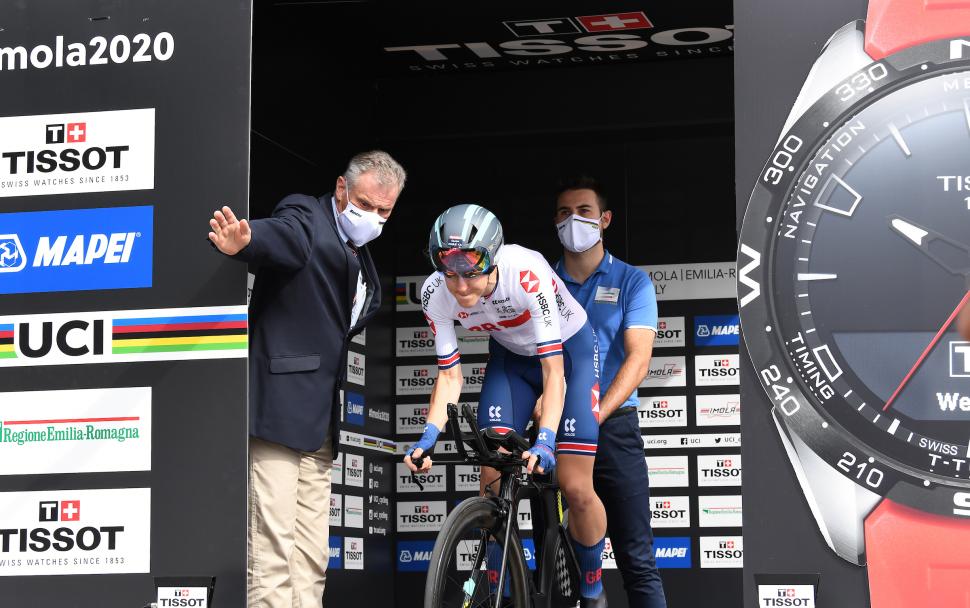Former professional cyclist Lizzy Banks’ doping suspension has been upheld by the Court of Arbitration for Sport — that despite the British athlete having previously convinced UK Anti-Doping the positive was not her fault nor due to negligence — the retired rider now detailing her “psychological torture” in enduring a two-year battle to try to clear her name, a period she described as an “eye-opening, devastating and at times frankly ludicrous saga”.
Banks, now 34, won two stages of the Giro d’Italia during a professional career that saw her ride for EF Education-EasyPost’s women’s team and compete at some of the sport’s biggest races.
However, in the summer of 2023 she tested positive for formoterol, a medication she had been using for asthma for four years, which “was detected at a concentration in line with how I have been prescribed it”, and chlortalidone, a diuretic, which was “detected at a low concentration indicative of contamination”.
Banks believes the positive came from a contaminated asthma tablet and set about trying to prove her innocence, undertaking extensive testing and medical work, investing significant amounts of her own money in the process (last year, 12 months into her legal fight, Banks said she had spent €40,000). Ultimately, she convinced UK Anti-Doping (UKAD) that “on the balance of probabilities” her positive was due to contamination.
However, the World Anti-Doping Agency (WADA) then appealed against the decision not to sanction Banks and it went to the Court of Arbitration for Sport (CAS), who ruled in favour of WADA.
Despite another controversy whereby it looked as though Banks’ suspension may not be backdated, her two-year sanction has been upheld and backdated to the time of the initial anti-doping test — meaning she would, in theory, be able to now return to competition, although she announced her retirement last summer.
Calling the ordeal “psychological torture” and calling for change, Banks said she “never wants anyone else to go through the same thing”.
“Over the past 16 months I have gone from being provisionally suspended, to being acquitted of all wrongdoing and having no sanction, to having an effective sanction spanning three years, two months and eight days, to eventually receiving a two-year sanction, backdated to the time of my anti-doping test,” she said in an in-depth blog published this morning.
“The reality, however, is that having been under a suspension until I finally received the revision from CAS on 22 June 2025, I have actually served two years, two months and 11 days. In truth, it felt like a lifetime.
 Lizzy Banks (credit: SWpix.com)
Lizzy Banks (credit: SWpix.com)
“I desperately want and need to move on from this now, to put this torrid chapter to bed, forever. To try to rebuild my health and career, to be able to work again and to rediscover the person I used to be before this process sucked the life and happiness from me.”
Last summer, UKAD ruled that Banks had “no fault or negligence” regarding the positive, a ruling which, at the time, she believed would be a “landmark” case.
“Despite the feeling of it being a sick joke that those last nine months of hell could somehow disappear in an instant and I would miraculously walk back in to the life I previously had, it was both a huge sense of relief and a deep feeling that the relentless work I had put in had truly been worth something,” she recalled. “I had successfully opened the eyes of one of the world’s most highly regarded anti-doping organisations. Despite all the personal loss, it felt like a milestone that would have a significant impact on future athletes and the shape of the system.”
To do so, Banks spent tens of thousands of pounds on follow-up testing and dedicated her life to researching her case. However, WADA appealed the UKAD decision with CAS, thus resuming the torturous legal fight.
Looking back now, Banks still believes “WADA’s appeal brief was, in my eyes, a mess”.
“It was riddled with inaccuracies regarding critical specifics of the case,” she said. “They disregarded the case law cited by UKAD and me, neither acknowledging its existence nor explaining why it should not apply. WADA had repeatedly misquoted case law, taken cases entirely out of context and at times I was completely unable to ascertain where their alleged facts had come from.”
When the case went to CAS, WADA submitted 13 new pieces of case law just one hour before the start of Banks’ hearing. She also accused WADA’s lawyers of “openly making jokes” and laughing throughout proceedings.
“UKAD didn’t even know about the email [with the new case law] until I arrived shortly after and mentioned it,” she said. “They couldn’t believe it either, we were all fully aware that this was explicitly prohibited by the CAS rules. For UKAD, at least they were all sports lawyers and were likely to have some knowledge of these cases. Clearly, that was not the position for me. I felt blindsided and on the backfoot, scrabbling to read and understand new cases instead of calmly preparing myself for what was to come. WADA were not playing fair.
“The hearing itself was one of the worst days of my life. I simply don’t have the words to describe the horrifying experience.
“WADA spoke first at the tribunal. They opened by claiming that if the appeal was not upheld, this would be the end for sport and fair play. Not because they thought I was a doper, but because they didn’t want athletes to be able to ‘get away with’ claiming contamination. The vehement repetition that my case was a ‘substantially unconvincing, unpersuasive, unevidenced contamination scenario’ made me feel physically sick. The denial of the science I had set out plainly for all to see.
 Lizzy Banks (credit: Alex Whitehead/SWpix.com)
Lizzy Banks (credit: Alex Whitehead/SWpix.com)
“WADA’s position was simply that I hadn’t met the standard of proof to demonstrate the source of chlortalidone was contamination. To be clear, WADA’s position was not that I had done anything wrong. On the contrary, they never even implied I could have done anything differently, and they accepted that I had demonstrated the utmost care in all aspects of my anti-doping responsibilities.
“Neither my husband Gabriel nor I were really prepared for what this onslaught by WADA would feel like. Due to the formal structure of the tribunal, I couldn’t just chime in and respond with an objection. By the time it got to my turn to speak, whatever WADA said, whether correct or not, was firmly lodged in the minds of the arbitrators. During WADA’s opening statement, I looked to my right where Gabriel was sitting. I had never seen him look like that before, he was grey, sweating and shaking, yet at the same time frozen, almost like a porcelain figure. I’m still not quite sure how we managed to make it through that wretched day.”
Banks said she struggled to sleep in the weeks following the tribunal and had vivid nightmares in which “I was so deeply trapped that I couldn’t even wake up”.
“There were many nights when I was helplessly crying out so loudly that I would wake up Gabriel, who would then desperately try to stir me back to consciousness,” she explained. “It was both deeply distressing whilst simultaneously being impossible to escape from.
“There was nothing I could do but wait at this point and I found it so incredibly hard. During that period, I barely left the house, I couldn’t face seeing or speaking to friends, I had no desire or motivation to do anything useful or any kind of exercise. On the very rare occasion that I forced myself out for a short jog, I just found myself bursting into tears and so upset by the mess of the whole thing. I wasn’t looking after myself properly, I wasn’t able to look after myself properly, to eat well, to think well or to sleep well. I was, quite simply, a shell of my normal self and stuck in a very deep depression.”
This summer, two years on, CAS ruled with WADA and upheld Banks’ suspension. She also had to fight to get the suspension backdated.
“It couldn’t have felt more like I was being well and truly punished for daring to stand up to the system,” she said, looking back at the entire two-year legal fight.
“Can I appeal the case? Theoretically, yes, but in the legal world it is regarded as practically impossible to successfully appeal a CAS case. The case can only be appealed before the Swiss Federal court. As the Swiss law itself describes ‘The grounds for setting aside an award are narrowly defined and exhaustive’. The reality is also that proving bias or dishonesty is incredibly difficult to do. If a wealthy expert in Swiss law who just so happens to be an expert in sports law wants to take it on and cover the costs, I would be more than happy for them to do so.
“I’m not sure yet whether I regret having carried on the fight. I am so empty right now that I barely know what I feel any more. But this is what they do to people like me. They crush us. They expect that we will just walk away and they will never have any consequences. But there must be consequences.
“I feel like this has to have been worth something. To have fought so hard and then just walk away will not help to change the system. Over the same eight days that my former colleagues were racing the Tour de France Femmes, I was engaged in my very own battle with myself to complete this write up. Having to go through every report over again in such fine detail in order accurately document the last 15 months has been absolute agony.
“I can’t count the number times I’ve broken down in tears or cried out to Gabriel that I just can’t do this. I can’t relive it yet again. I desperately want this to be over for me, but I never want anyone else in my position to have to go through the same thing too. Lessons must be learnt.
 Lizzy Banks (credit: SWpix.com)
Lizzy Banks (credit: SWpix.com)
“I will close by asking the other members of the anti-doping and sporting communities to stand with me that something has to change. The rules must be updated and modernised to reflect the scientific reality of contamination. The system must overhauled. We cannot have a system that allows the career of an athlete of integrity who has been found not to have cheated to end up in a position where they have no chance of defending themselves and no chance of receiving anything less than a two-year sanction. This is not proportional, not fair, and not right.”
Banks finished by stating that “from both personal conversations and knowledge of other athletes’ cases”, she believes UKAD, British Cycling and the French, German and US anti-doping agencies all agree with her position.
“I implore these bodies to stand with me that rules surrounding contamination must change,” she said.”The rules and the system are simply not good enough and as it stands are not fit for purpose. Unless we fight for it, nothing will ever change. I have done my bit and now it is your turn.”
Commenting on the case, British Cycling highlighted Banks’ determination and perseverance in defending herself and, while acknowledging CAS’s ruling, suggested “lessons can be learned from this case”.
A spokesperson for the governing body said: “Throughout this case — since UKAD initially notified Lizzy of the anti-doping rule violation in July 2023, which was later eliminated on the grounds of no fault or negligence — Lizzy has demonstrated through her detailed evidence submissions that she took her anti-doping obligations very seriously, always exercising an extremely high level of care.
“We acknowledge the decision published by the Court of Arbitration for Sport (CAS) but hope that lessons can be learned from this case, to avoid inconsistencies and to ensure that clean athletes can be confident that the products they diligently choose to use or consume on a daily basis would not result in an anti-doping rule violation.
“Irrespective of the outcome, it’s clear the process Lizzy has endured has been confusing, emotionally torturous and at times, lacked the levels of clarity and empathy which we would expect to see from anti-doping authorities.
“British Cycling will always be steadfast in supporting a fair and consistent approach to clean sport and would urge anti-doping authorities to safeguard the wellbeing of athletes who are navigating the complexities of such anti-doping rule violation proceedings in the future.”
You can read Lizzy Banks’ full 13,000-word blog post here, the piece a comprehensive personal account of the process and human impact of challenging an anti-doping ruling.

